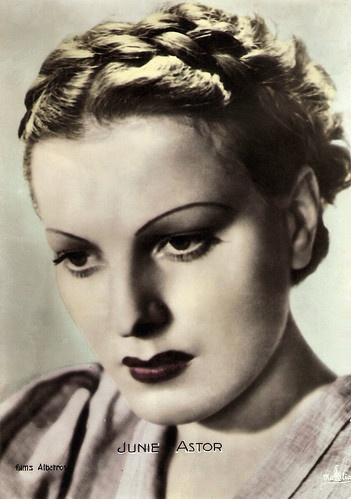
French postcard by Massilia. Photo: Filma Albatros. Publicity still for Les Bas-fonds/The Lower Depths (Jean Renoir, 1936).

Italian postcard by Rizzoli E C., Milano, 1941. Photo: Films Albatros. Publicity still for Les Bas-fonds/The Lower Depths (Jean Renoir, 1936).
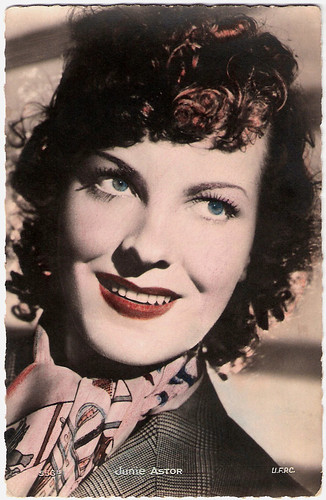
French postcard by Ed. Chantal, Rueil, no. 556B. Photo: U.F.P.C.
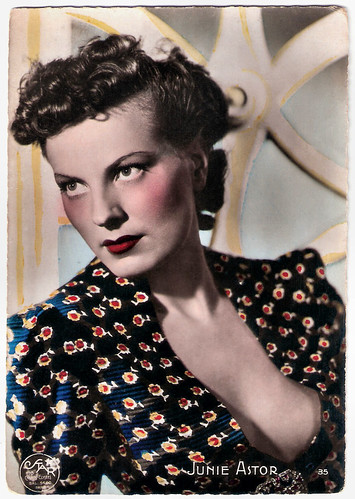
French postcard by Editions O.P., Paris, no. 35. Photo: Star, Paris.

French postcard by Editions O.P., Paris, no. 82. Photo: Le Studio, Paris.
Non-photogenic
Junie Astor was born as Rolande Jeanne Risterucci in Marseille, France in 1911. She was obliged to learn classic ballet which she abandoned for lessons at the Conservatoire National Supérieur d’Art Dramatique.
This formation permitted her to have her début on stage in the play 'Lundi 8 heures' (Monday at Eight) at the Théâtre des Ambassadeurs in 1933, in the company of Julien Carette. The same year Junie Astor also started in the cinema with D’amour et d’eau fraîche/Love and Cool Water (Félix Gandéra, 1933), with Fernandel.
The beautiful newcomer made her mark in Ademaï aviateur/Skylark (Jean Tarride, 1934) with Noël-Noël. From then on, she played one supporting part after another, such as in Tovarich (Jacques Deval, 1934) with André Lefaur and Irène de Zilahy, Mayerling (Anatole Litvak, 1936) with Charles Boyer and Danielle Darrieux, and in Club de femmes (Jacques Deval, 1936).
On the instigation of her paramour, producer Alexander Kamenka, Astor played Jean Gabin's love interest in Jean Renoir’s liberal adaptation of Maxim Gorki’s The Lower Depths: Les bas-fonds (1936), though the real leads were for Gabin as the bum and thief Pepel and Louis Jouvet as the impoverished Baron. Years later Renoir gave a severe critique, condemning Astor as non-photogenic.
Not everybody thought that way, though, because in 1937 Astor won the first Prix Suzanne Bianchetti for the most promising female acting talent of the year. Suzanne Bianchetti had been an actress in the French silent cinema, and her husband the critic René Jeanne had created the award. The award comes in the form of a medallion engraved with Suzanne Bianchetti's image. Since its inception, the Prix Suzanne Bianchetti has been annually awarded to many of the greatest names in French cinema who went on to national and international stardom.
Despite the prestigious award Astor had to be satisfied with mere supporting roles. However, she had an active career in the 1930s and worked with some of the most important directors of the era. Highlights were the Marcel Achard adaptation Noix de coco/Cocoanut (Jean Boyer, 1939) with Raimu and Marie Bell, and Battement de cœur/Beating Heart (Henri Decoin, 1940) with Danielle Darrieux and Claude Dauphin.
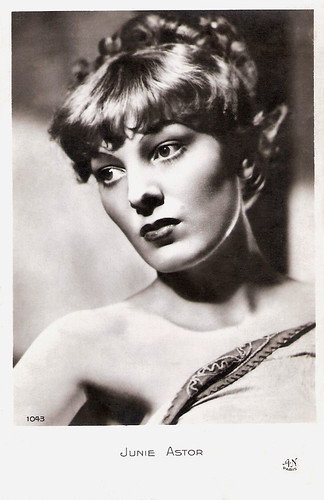
French postcard by A.N., Paris, no. 1043.
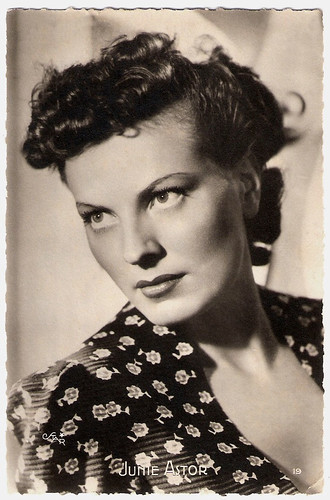
French postcard by Editions O.P., Paris, no. 19. Photo: Star.
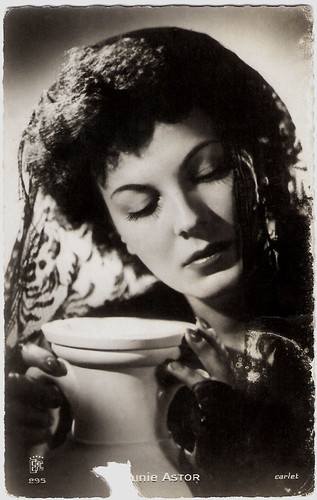
French postcard by Editions et Publications Cinematographiques (EPC), no. 295. Photo: Carlet.
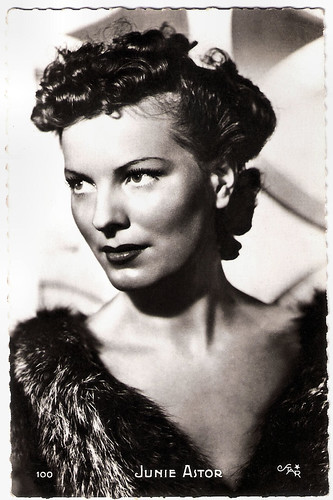
French postcard by Editions P.I., Paris, no. 100. Photo: Star, Paris.

Italian postcard by Rizzoli, Milano, 1940. In 1940, Junie Astor acted in the Italian film Tutto per la donna/Everything For The Woman (Mario Soldati, 1940).
Train of Shame
In 1939-1940 Junie Astor tried her luck in Italy with such films as Tutto per la donna/Everything For The Woman (Mario Soldati, 1940) with Antonio Centa, but these productions were not shown in France. The year before she had acted in the Italian films Un mare di guai/A lot of trouble (Carlo Ludovico Bragaglia, 1939) and Il carnevale di Venezia/The Carnival of Venice (Giuseppe Adami, Giacomo Gentilomo, 1939).
In 1942 she was back in France to appear in L’éternel retour/Love Eternal (Jean Delannoy, 1943) with Madeleine Sologne and Jean Marais. Together with Danielle Darrieux, Suzy Delair, René Dary, Albert Préjean and Viviane Romance, Junie Astor was part of the so-called ‘train of shame’ that went to Nazi-Berlin in March 1942 to visit the Berlin film studios. The reason for the visit was the première of Premier rendez-vous/Her First Affair (Henri Decoin, 1942) starring Darrieux. If Danielle Darrieux’ presence was explainable, for she wanted to liberate her husband Porfirio Rubirosa, one wonders why the other actors, working for the Franco-German Continental company, accepted to join this masquerade set up to legitimise the Nazi regime.
After the Liberation Astor had one last major role in Du Guesclin (Bernard de La Tour, 1948), a chronicle of the life of Bertrand du Guesclin, grand officer of the French army in the 14th century featuring Fernand Gravey. Astor married her director Bernard De la Tour and they founded Astor Production, but the promising initiative didn’t strike ground – the marriage neither (they split after six years).
Astor nevertheless joined Raymond Pellegrin in Coupable?/Culprit? (Yvan Noé, 1950) and Eddie Constantine, Noël-Noël and Jean Richard in the comedy Les truands/Lock Up Your Spoons (Carlo Rim, 1956). Astor also returned to the stage in 'Ombre chère' (Dear Shadow, 1952) by Jacques Deval and with Robert Lamoureux.
In the 1960s she played in such crime films as Interpol contre X/Interpol Contra X (Maurice Boutel, 1960) and L’homme de l’Interpol/The Man From Interpol (Maurice Boutel, 1966), but these B-series policiers didn’t help her career. Tired of her profession, Astor focused on the exploitation of two Parisian cinemas, Astor and Rio Opéra.
She finished her film career with Joë Caligula - Du suif chez les dabes/Joe Caligula: Tallow for the Old Men (José Bénazéraf, 1966) with Gérard Blain, a film that for two years would remain forbidden by the French censors. Christopher Underwood at IMDb: "Splendid, sparkling black and white widescreen crime caper from Jose Benazeraf. Occasionally resembling a US 'roughie' this is a stylised Movie with, very much, the look of the french new wave. Surprisingly violent with some battle between a bunch of cool kids and the more established crooks and pimps."
Junie Astor died at the age of 55 years, because of a car accident in 1967 in Sainte-Magnance, France. She lies buried at the cemetery of Bagneux.
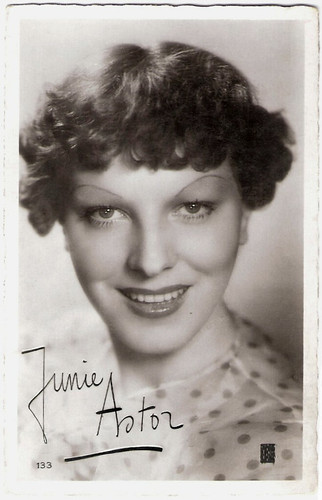
French postcard by Editions et Publications Cinematographiques (EPC), no. 133.
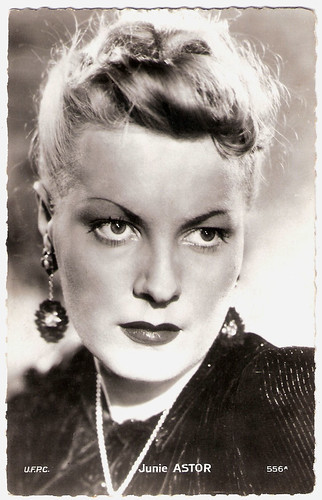
French postcard by Edit. Chantal, Rueil, no. 556A. Photo: U.F.P.C.
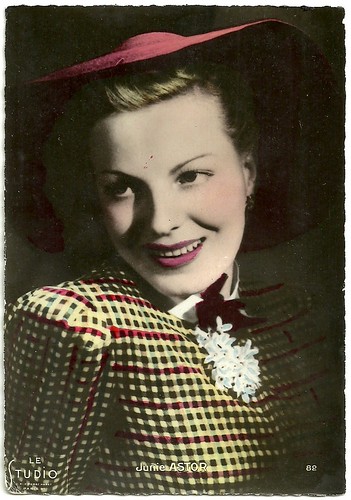
French postcard by Editions O.P., Paris, no. 82. Photo: Le Studio, Paris.
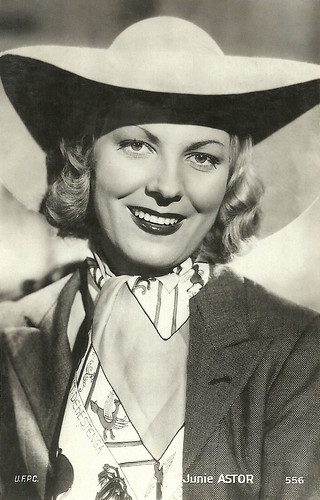
French postcard, no. 556. Photo: U.F.P.C
Sources: Olivier Sinqsous (Ciné-Artistes - French), Christopher Underwood (IMDb), Wikipedia (English and French), and IMDb.
No comments:
Post a Comment